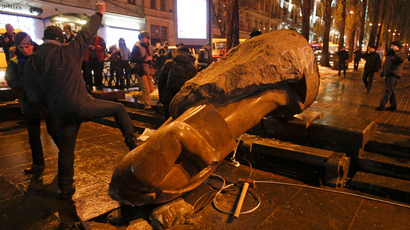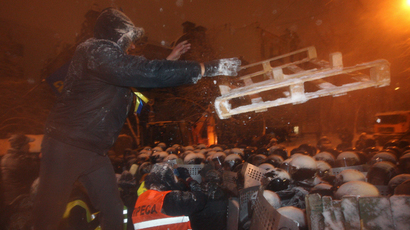'Muddling and meddling'? US, EU politicians plunge deeper into Kiev protest
Pro-EU protests in Kiev have been marked by western politicians’ regular visits to the protesters’ camp, and their emotional condemnations of Ukraine’s authorities. This is seen by some analysts as unprecedented meddling in a country’s internal affairs.
US Assistant Secretary of State, Victoria Nuland, handed out snacks on Wednesday to protesters on Kiev’s Independence Square (or ‘Maidan’ as it’s nicknamed), making those who witnessed the scene wonder if a reciprocal gesture would be imaginable during something like an Occupy Wall Street protest in New York.
Nuland’s act of philanthropy and meeting with President Viktor Yanukovich, where she reprimanded him for “absolutely impermissible” treatment of the protesters, came hours after John Kerry made a very strong statement on Ukraine.
“The United States expresses its disgust with the decision of Ukrainian authorities to meet the peaceful protests in Kiev’s Maidan Square with riot police, bulldozers and batons,” The US Secretary of State’s statement read. The word “disgust” rarely if ever appears in diplomatic messages.
The US State Department also says that all policy options, including sanctions against Ukraine, are under consideration.
"All policy options, including sanctions, are on the table, in our view, but obviously that still is being evaluated," State Department spokeswoman Jen Psaki told reporters. However, she declined to explain exactly which kind of sanctions are under consideration.
Tensions ran truly high in Kiev early on Wednesday, when police started to dismantle some of the barricades in the city center and scuffles broke out. However, as RT’s correspondent on the ground saw it, the distribution of force was somewhat equal.
From what I've witnessed both sides (police and protesters) resisting violence. #euromaidan#Kiev
— Paul Scott (@PaulScottRT) December 11, 2013
RT’s Irina Galushko, currently in Kiev, recalls the way protests were handled in Istanbul in Turkey earlier this year, where she was then reporting on massive rallies in the city.
“Compared to #Taksim -- this ain't no dispersal or assault,” she said in her Twitter, wondering why the level of outrage from the West is so much higher when it comes to comparatively less violent events in Ukraine.
Washington-based human rights watchdog, Freedom House, has recently called on President Yanukovich “to offer his resignation as a way to trigger early presidential elections, the only non-violent way to end the standoff with demonstrators”.
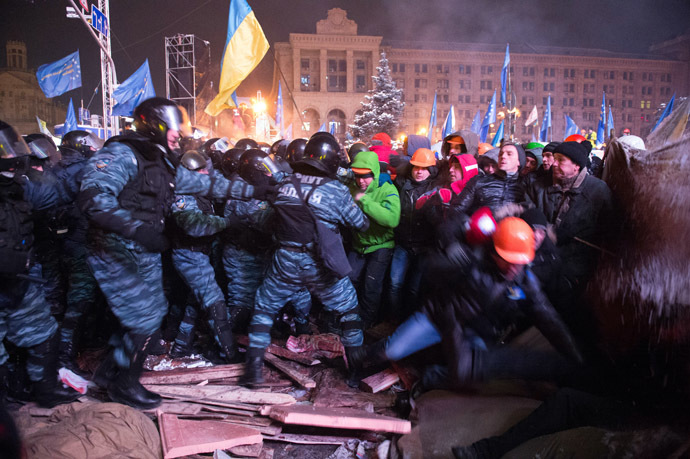
It did not though go as far as to call for Erdogan’s (Turkish PM) resignation after police tear-gassed protesters in Istanbul. The organization then came up with much milder “calls on the Turkish government to respect its citizens’ right to freedom of assembly”.
The Ukrainian opposition has meanwhile taken on the toughest stance possible. It’s now calling for something much bigger than just signing an agreement with the EU.
“There can be no compromise with cutthroats and dictators,” Vitaly Klitschko, leader of the Udar (Strike) opposition party, said as cited by his press-service. “They should be gotten rid of. The number one issue is certainly resignation of Yanukovich and the whole of his rotten government. It would be strange to hear of any compromise like “technical governments” or changes in the Constitution. All of this would be a manipulation and a game in favor of Yanukovich to help him stay in power."
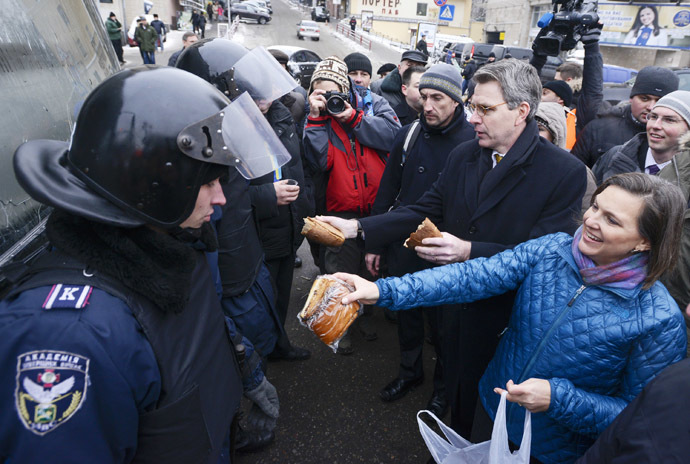
Pepe Escobar, an investigative foreign affairs journalist, believes if the opposition went out on the streets with similar calls in any other western country, participants of such a rally “would be branded as a mob and dispersed by all means”.
“Can you imagine that this was happening in Washington? Like it happened during Occupy Wall Street. They were evicted with force from Zuccotti Square in New York. If this was happening in London? Do you remember the [latest] student demonstrations in London? The repression was really hard core,” Escobar told RT.
His attitude is echoed by Alexander Mercouris, a legal expert and blogger. He doubts that visits to Maidan by officials like EU foreign policy chief, Catherine Ashton, can in any way resolve the situation in Ukraine.
“I try to imagine a situation where let’s say there was a riot or a protest in central London and let’s say somebody from a foreign country, let’s say Russia, came along and attempted to negotiate between the protesters and the government. It seems most strange to me, I have to say,” Mercouris told RT.
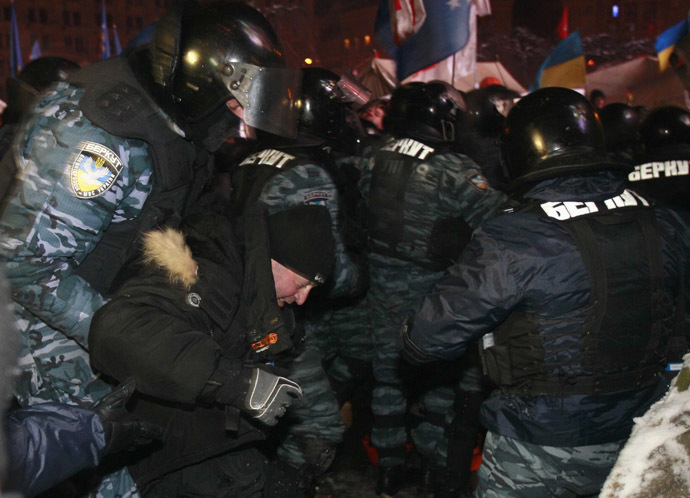
“And I wonder whether that is to a wise, actually. It seems to me that when outsiders involve themselves in the affairs of a country, which they don’t always understand very well – let’s remember, Ms Ashton does not speak Ukrainian, she does not speak Russian, she’s probably not really familiar with the internal political situation in Ukraine – one wonders what possible compromise or solution they can offer.”
Political analyst Aleksandr Pavic believes that by taking sides, the West risks turning the Ukrainian standoff into another Yugoslavia.
“The same thing happened in the early nineties in Yugoslavia,” Pavic told RT. “The West sided with Slovenia and Croatia. And what happened? We had a civil war that took four years to die down. I can see a repeat of this, unfortunately, in Ukraine.”














